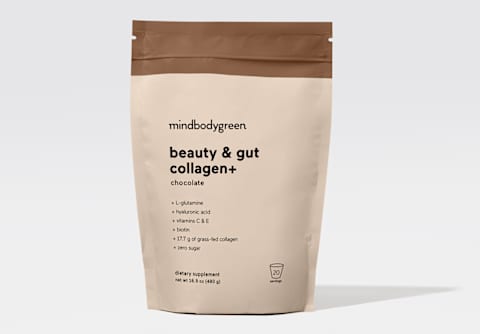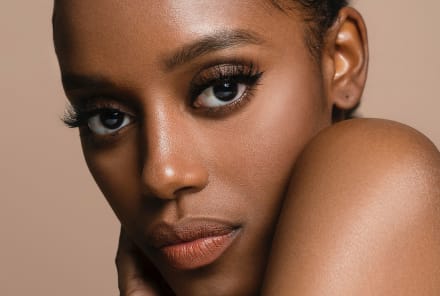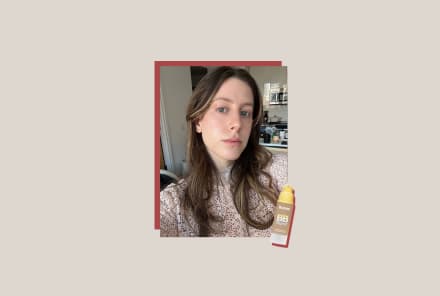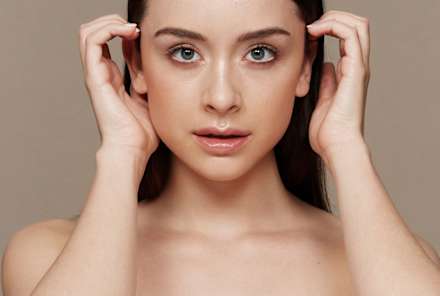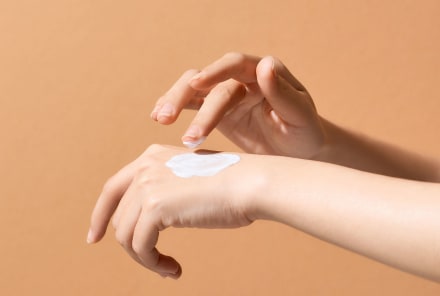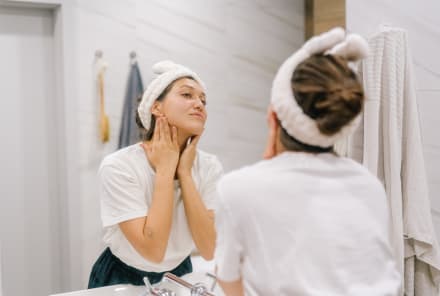Advertisement
The 7 Best Supplements To Take If You Have Dry, Damaged Hair*


Shiny, hydrated hair can be hard to achieve with just a good conditioner alone. That's why it's so important to pay attention to not only what you're putting on your hair but what you're putting into your body—including supplements.*
Don't know where to turn in the vast world of supplementation? Well, experts say these seven nutritional ingredients (peptides, nutrients, etc.) have strong, sound research to support their role in healthy hair growth.*
Collagen
"Hair is made up of keratin protein, and it requires a complete diet in order to grow to its maximum potential," explains trichologist Shab Caspara. One of the most important elements of that diet? Amino acids. "Amino acids are the building blocks of cell membranes and keratin. Keratin is the material that hair is made of," says Joshua Zeichner, M.D., a New York City–based dermatologist and director of cosmetic and clinical research in dermatology at Mount Sinai Medical Center.
One way of the best ways to get more amino acids in your diet is through collagen.* It is the most abundant protein in your body that can strengthen hair and buffer against hair follicle damage.* "As collagen is digested by your gut, it is broken down into its individual amino acids that circulate throughout the body," Zeichner says. Those amino acids can then be turned into keratin to form healthy hair at the follicle.*
For best results, look for a grass-fed bovine collagen supplement that contains collagen types I and III, the types of collagen that are vital in promoting hair health.* "Grass-fed collagen is the way to go," says Ariane Hundt, M.S., a clinical nutrition coach in New York City.
Biotin
Biotin is an essential B vitamin (meaning we need to consume it daily) that's known to be important in hair and nail growth. "When patients have a biotin deficiency, they suffer from thinning, dry hair, and dry skin," says Zeichner. "Supplementing biotin may help in supporting dry scalp and dry hair."* (Biotin deficiency is rare in the U.S. population, however. While dry hair can be an indicator of an issue, as with most deficiencies, the only way to tell for sure is by getting a blood test from your doctor.)
Biotin is thought to support healthy hair growth because it is involved in the production of keratin1, the main component of hair.* In one small study, women reported hair growth when supplementing with biotin (as part of a multi-ingredient supplement) when compared to those given a placebo.*
Additionally, biotin is a common addition to other hair and beauty supplements, such as collagen.
RELATED: Best Hair Growth Serums Of 2023
Silica
Silicon (AKA silica) is a mineral that's often found in nature and in the body and is commonly used as an ingredient in food, supplement, and pharmaceutical products, Zeichner says. Research has discovered that silicon can be found in the bones, tendons, aorta, liver, and kidneys. "The exact mechanism is unclear, but silica2 is thought to be needed by the human body for proper production of skin, collagen, bones, and hair,"* he says.
"Silicon supplements have been shown3 to promote hair strength, brightness, and thickness and decrease hair breakage," says California-based holistic dermatologist Cynthia Bailey, M.D., a diplomate of the American Board of Dermatology.* While it's not entirely clear why this can happen, Bailey says that one theory is that it may interact with keratin, the protein found naturally in hair, which gives hair its structure.*
Vitamin E
Vitamin E is an essential fat-soluble micronutrient that's "one of the best vitamins for the scalp," says Reslan.* Vitamin E is believed to work via anti-inflammatory properties on your skin and scalp4, slowing free radical damage around your hair follicles that can lead to premature graying and hair damage, Zeichner says.*
Keep in mind that it can take a little time for vitamin E to work on your hair: In Bailey's experience, it takes a week for the vitamin to help balance the sebum and oily secretions that help keep your hair and skin moisturized.* In the meantime, look for hair products with the vitamin along with supplementation, because "when applied topically, vitamin E helps produce collagen and healthier skin cells for your scalp," Reslan adds.
Omega-3s
Omega-3 fatty acids are healthy oils that are naturally found in foods, Zeichner says. mbg's vice president of scientific affairs Ashley Jordan Ferira, Ph.D., R.D.N. expounds further: "You'll find the omega-3 fat ALA in foods like flaxseed, walnuts, and soy, while oily fish like salmon, anchovies, and sardines deliver on two different omega-3s, EPA and DHA." Ferira adds that, "aside from being majorly under consumed in the American diet, these omega-3s, especially the marine-derived ones EPA and DHA, are linked to diverse health benefits like supporting cardiometabolic and brain health, thanks to their antioxidant and anti-inflammatory properties.*
In the beauty realm, Zeichner says, some research suggests5 that omega-3 fatty acids can support your skin and hair health when they're taken along with other antioxidant supplements.*
Iron
Iron deficiency is a common nutritional deficiency worldwide6, and it can lead to hair issues, including dryness and hair loss, says Bailey.* While we don't know exactly how iron affects hair growth specifically, we do know that without the proper iron intake, hair follicles do not function properly. Iron supplementation isn't for everyone—as taking the supplement as ferrous oxide or sulfate can cause digestion and stomach issues at higher doses in some people (Note: chelated forms of iron are gentle though)—so talk to your doctor to see if you need to be tested for a deficiency.*
Vitamin C
Vitamin C is a water-soluble vitamin our bodies cannot make on their own, and thus is essential for us to ingest daily. It's extremely important for a few functions in the body. For starters, vitamin C promotes your natural collagen production7 (great for hair and scalp, as we've noted previously) as well as stabilizes the collagen you have in the body already.* Additionally, its antioxidant properties neutralize oxidative stress and free radicals, which contribute to hair loss and cell damage. And finally, vitamin C aids the body in absorbing iron8, which we also know is beneficial for hair growth.*
The takeaway
What you put into your body is important for fueling the growth and health of your hair. If hair dryness is an issue for you, a supplement can help to support your hair's health naturally.*
Editor's Note: This article was originally published on March 2, 2020 and has been updated overtime. A previous version of this article contained the incorrect name for Shab Reslan. It's current publication date reflects their correct name.
8 Sources
- https://www.ncbi.nlm.nih.gov/pmc/articles/PMC5582478/
- https://www.ncbi.nlm.nih.gov/pubmed/17435951
- https://www.ncbi.nlm.nih.gov/pmc/articles/PMC4938278/
- https://www.ncbi.nlm.nih.gov/pmc/articles/PMC3819075/
- https://www.ncbi.nlm.nih.gov/pubmed/25573272
- https://www.who.int/health-topics/anaemia#tab=tab_1
- https://www.sciencedirect.com/topics/engineering/collagen-synthesis
- https://www.ncbi.nlm.nih.gov/pubmed/2507689
